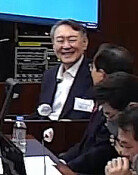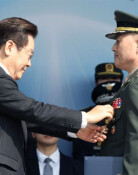U.S. Says No to Norths Oil Demands
U.S. Says No to Norths Oil Demands
Posted February. 13, 2007 07:45,
The six-party talks are in trouble, with the sticking point being deciding how much heavy oil should be provided to North Korea in exchange for their denuclearization.
Christopher Hill, the U.S. chief representative and Assistant Secretary of State for East Asian and Pacific Affairs, announced before having a talk on February 12, Today is the last day of the talks.
Assistant Secretary Hill met North Korea`s Vice Foreign Minister Kim Kye Kwan, who is the North Korean chief representative, on February 11 and indirectly expressed his intention that If North Korea continues not to accept the upper limit of energy to be provided to the North, the talks will be suspended.
That means that the yearly provision of one million ton of heavy oil which the North is requesting is not acceptable.
Meanwhile, South Korea tried to persuade North Korea by saying if the North take steps such as denuclearization beyond the closure of nuclear facilities, the South could provide more than 500,000 tons of heavy oil. The closure of nuclear facilities means preventing maintenance for re-operating the facilities, while denuclearization means removing key parts from the nuclear facilities themselves.
A government official said, The goal of the talks this time should not be just stopping operation by switching off the facilities.
Also, ways of providing aid via gas or electricity instead of heavy oil were discussed during the talk on that day. A diplomatic source said, A plan is being discussed where Russia provides the North with gas or electricity, and the South, the U.S., Japan, and China pay for it.
The U.S. is concerned about providing energy to the North in a way that is reminiscent of the Geneva agreement under which the North did not abolish its nuclear program even though the U.S. provided 500,000 tons of heavy oil a year for eight years through the North-US Geneva agreement in 1994.
However, the North has requested the provision of one million tons of heavy oil or the energy equivalent in exchange for the closure of its nuclear facilities every year. A government official said, The amount of energy the North is requesting has gotten lower since the beginning, but it is still too much.
Meanwhile, the Asahi Shinbun, a Japanese newspaper, reported on February 12 that the U.S. said to the South Korean and Japanese governments that they intend to release $11 million out of $24 million in North Korean funds, which are stuck in Banco Delta Asia (BDA) in Macao.
The U.S. said this to the South Korean and Japanese governments after Assistant Secretary Hill met North Korea`s Vice Foreign Minister Kim Kye Kwan in Berlin, Germany, and discussed the issue of the North Korean funds they will hand over to the Macanese authorities.
However, a South Korean government official denied it, saying, I havent heard that.
Before that, the Chosun Sinbo, a bulletin of the pro-North Korean Federation in Japan, reported on February 11 that the U.S. offered to lift the financial sanctions related to the BDA bank within 30 days as a guarantee to the North during a North Korea-U.S. Berlin meeting.
gun43@donga.com sya@donga.com




![두쫀쿠가 뭐라고…영하 8도에 아이들 1시간 줄세운 어린이집 [e글e글]](https://dimg.donga.com/c/138/175/90/1/wps/NEWS/IMAGE/2026/01/09/133126969.3.jpg)
![지하철 타고 가는 북한산성…외국인도 반한 ‘K등산 맛집’[전승훈 기자의 아트로드]](https://dimg.donga.com/c/138/175/90/1/wps/NEWS/IMAGE/2026/01/10/133120824.1.jpg)

